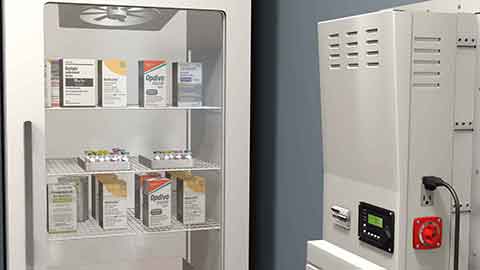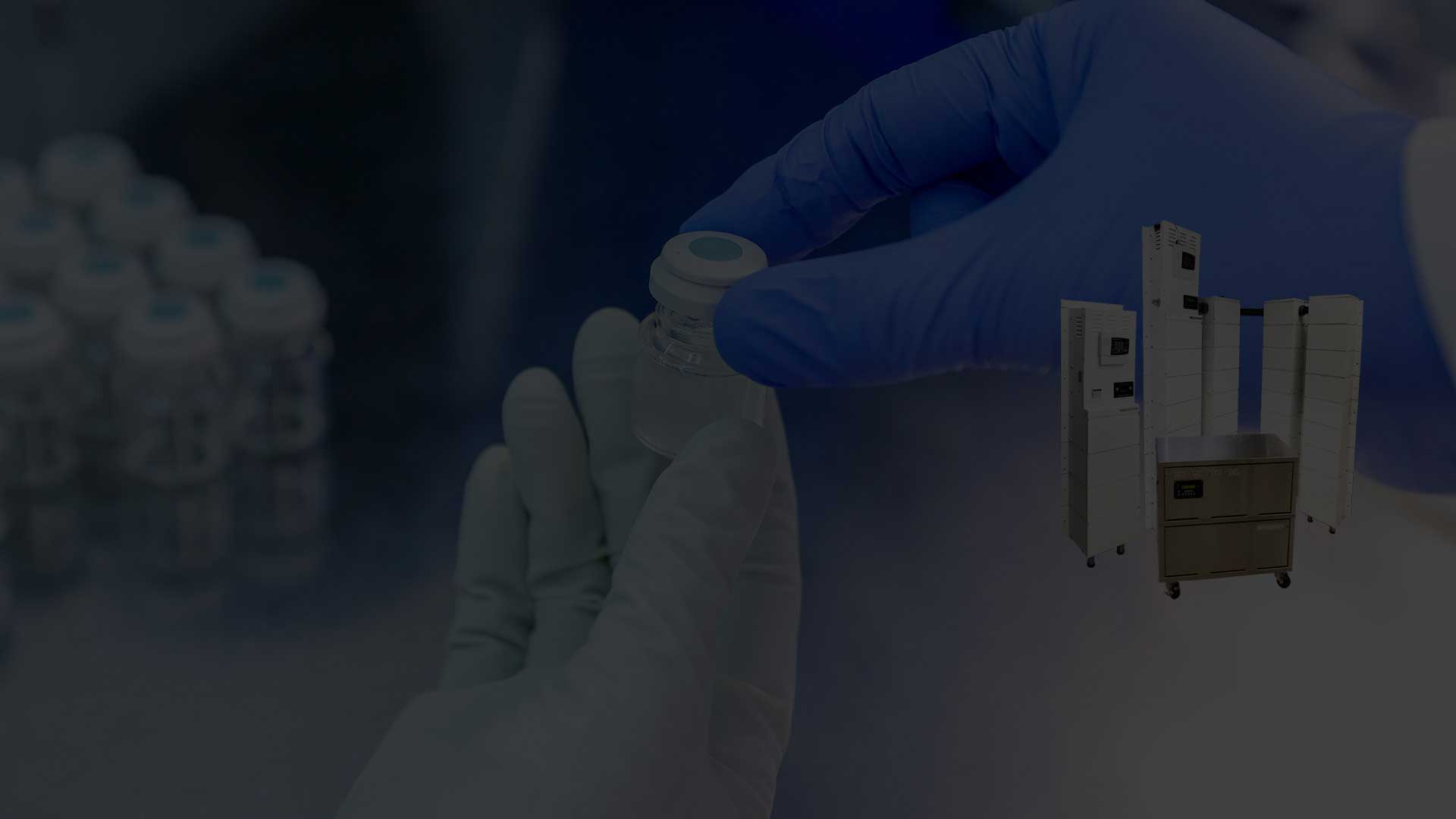Powering Healthcare: Best Practices for Sizing UPS Systems
In case you missed it, catch up on the previous entries in our series detailing the design and operation of Healthcare facilities and why backup power is crucial for modern and fully-optimized operations.
Architects and electrical engineers play a vital role in designing healthcare facilities due to rapid industry changes. Not only are they responsible for creating an environment that promotes healing. They also must ensure the seamless operation of critical medical equipment.
Imagine this. You're client is a bustling hospital interested in state-of-the-art technology. Lives are being saved. And a cache of biomedical materials, pharmaceuticals and research samples, are being stored. In such a demanding environment, the reliability and speed of backup power becomes paramount. 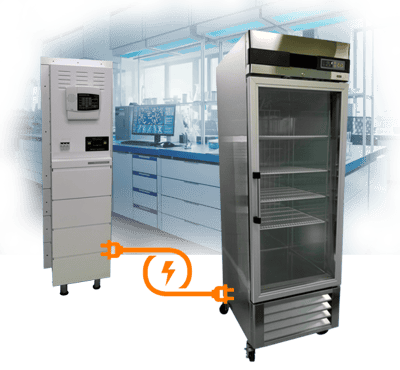
Uninterruptible Power Supply (UPS) systems (commonly referred to as battery backup systems) have emerged as a dependable solution. Their main goal is not just to protect healthcare facilities from power outages. They can also provide security in cases of power fluctuations (also called "brownouts").
In this article, we delve into the best practices for sizing UPS in medical applications. We'll explore the importance of backup power in healthcare settings, and the value in focusing on cold storage needs.
The Vital Role of Backup Power in Healthcare Facilities
In healthcare every second counts. As such, the proper backup power solution can be a matter of life or death. Hospitals and medical facilities house a multitude of life-critical equipment.
This ranges from patient monitoring systems and surgical tools to pharmacy refrigeration units. During a power outage or fluctuation, unprotected medical devices will stop working immediately. This jeopardizes not only your cold storage inventory, but the safety and well-being of patients and staff alike.
To avoid these scenarios backup solutions like a UPS are essential. They ensure continuous operation by powering on instantly and seamlessly. This provides on-hand staff the time needed to execute the facility's emergency preparedness plan.
As stated before, the protection of sensitive biomedical materials is important too. Inventory like vaccines, blood products, and research specimens, are often fragile and irreplaceable.
Thus, proper consideration must be given to these Temperature-sensitive materials. They often require precise holding temperatures. So precise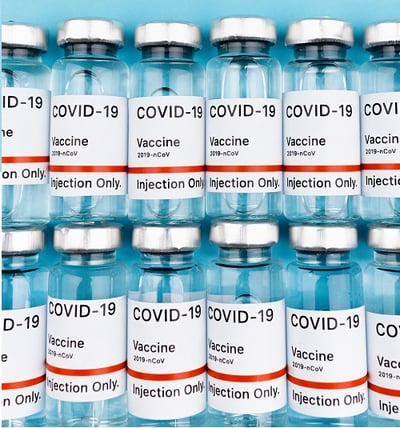 , that any power interruption could lead to spoilage or degradation. These events are also known as "temperature excursions".
, that any power interruption could lead to spoilage or degradation. These events are also known as "temperature excursions".
For materials like the COVID-19 vaccines, this compromises their efficacy, rendering them unusable. By employing robust backup power systems, healthcare facilities can protect these invaluable biomedical materials. This will both maintain the integrity of vital research and preserve medical advancements.
The Art of Sizing UPS for Optimal Performance
Selecting the right size of UPS system for medical applications is a careful balance between power and efficiency. Here are some best practices to consider when sizing UPS for healthcare facilities:
Assessing Power Needs:
First, analyze the power usage of the most critical equipment. Be sure to work closely with both staff and equipment manufacturers to gather accurate data. This analysis should include both the startup wattage and running wattage. This will ensure a proper fit and keep your appliances running.
Factoring in Redundancy:
In healthcare settings, redundancy is a lifesaver. As a best practice incorporate parallel UPS units or an N+1 configuration. This ensures backup power remains available, even in the event of a UPS failure. Redundancy also minimizes the risk of downtime and keeps operations running smoothly.
Scalability and Flexibility:
Healthcare facilities are dynamic environments. Naturally, their power needs will change over time. This can be due reasons ranging from technological advancements to facility expansion. We suggest opting for a solution that is easily scalable and flexible. This will allow you to adapt to changing power requirements and future growth
Reliable Battery Technologies:
The heart of a UPS system lies in its batteries. And because uptime is key, we embrace mature and reliable battery technologies like lead-acid. Sealed lead-acid batteries offer longer life cycles, reduced maintenance needs, and lower replacement costs than lithium-ion.
Monitoring and Maintenance:
Implement a proactive monitoring and maintenance regime for your UPS system. Test the UPS often to check how it performs when the power goes out. You should also inspect it regularly to find and fix any problems before they get worse.
The Significance of Protecting Biomedical Materials
In addition to safeguarding medical equipment, UPS systems play a pivotal role in protecting delicate biomedical materials that are the backbone of healthcare advancements. Let's explore their importance in ensuring the safety and efficacy of these materials:
Medicines:
Vaccines and pharmaceuticals are sensitive to temperature fluctuations. A sudden power outage can compromise their potency, rendering them ineffective. UPS systems provide continuous power, preserving these life-saving medicines and ensuring their availability for patients in need.
Samples:
Healthcare facilities regularly handle research specimens and diagnostic samples. Temperature-sensitive samples must be stored under precise conditions, and any disruption in power could lead to sample degradation, resulting in unreliable test results and jeopardizing research efforts. UPS systems ensure that research samples remain intact and viable, supporting medical breakthroughs and scientific advancements.
Blood Products:
Blood banks rely on consistent power to preserve blood products. These products have a limited shelf life and require specific storage temperatures to maintain their integrity. UPS systems act as a safety net, ensuring the continuous operation of refrigeration units and preventing any wastage of life-saving blood products.
Conclusion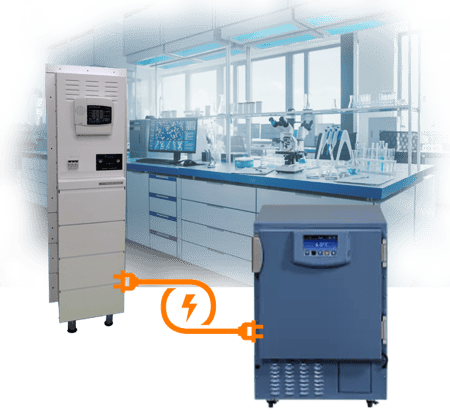
Healthcare is one of the highest pressure sectors out there. That is why backup power solutions, like UPS systems, are indispensable. Architects and electrical engineers are the ones who hold the keys to designing facilities with a seamless and reliable power supply. They are the first step in ensuring the safety of patients.
By following best practices for sizing UPS in medical applications, healthcare professionals can embrace the future of healthcare. That is, one where outages are no longer a threat, and medical facilities operate with 100% uptime.
Battery backup systems offer instant and automatic power for both medical equipment and laboratory appliances alike. No staff needs to be on-site to monitor or start the generator. Valuable samples and inventory will stay safe without any extra effort.
Additionally, their vertical, cabinet-like form factor and leak-proof batteries mean they easily install in tight spaces. So, now matter how crowded the room is, you can ensure appliances are protected.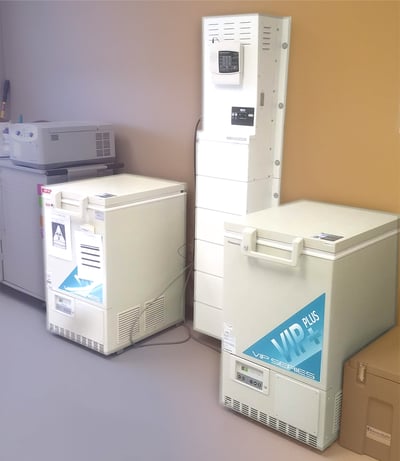
Plus, if you're truly tight on space, a hardwired backup power unit can supply remote power to your appliance. It does this instantly and via the outlet the appliance is already plugged into.
All options guarantee a smooth switch from utility power to backup power. So you'll avoid downtime and temperature excursions, protecting patients and inventory alike.
And for Facilities who perform outpatient operations, battery power instantly engages, keeping your operations going with zero downtime due to their advanced battery technology.
Even better, is that battery generators can be outfitted with as much power as you want. So system’s can be designed with enough power to protect a facility’s inventory:
- Overnight
- All day
- Over a weekend
- Or even for a whole week.
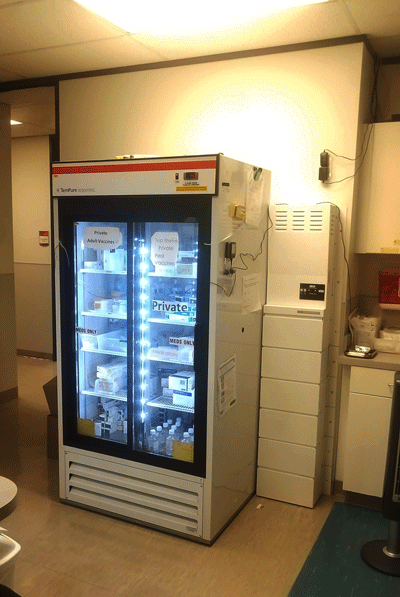
So, to protect your facility from tens of thousands of dollars in lost inventory speak to a Medi-Products battery backup expert.
They’ll help design you a system that both meets your power needs and will fit inside your facility—for a much lower cost than what your vaccines are worth. So a backup power system pays for itself the first time your power goes out.
Designing a system for you is as easy as taking a picture of your appliance’s nameplate, and a photo of the room where it’s in.
Then, you just email both photos to our Product experts, and we’ll provide you with multiple options for backup power protection.
At Mediproducts, we provide you with all the help you need to keep up with NFPA 99 changes, including all relevant local and regional standards. If you have questions about meeting NFPA requirements for your emergency and electrical power systems, contact us. We will be happy to answer all of your questions.
For more information contact: 1.800.7653237
Read the next blog in our series on backup power when designing healthcare facilities here.

